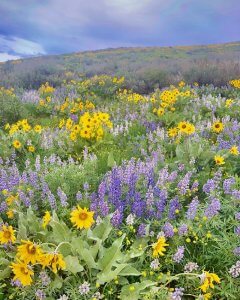The Methow Valley is a special place. The mountains pack with snow in winter, the rivers run cold, and the wildlife and people have plenty of space to move. Farms idyllically spot the landscape, residents know each other when they pass on the street and there is a palpable sense of community. It is a Valley that sustained the Methow people for thousands of years.
But this Valley we know and love doesn’t exist by accident.
Forty-five years ago, committed citizens of the Valley formed the Citizens Council and began raising their collective voice against the forces that routinely ruin mountain valleys like this one: uninhibited growth, a lack of planning, and a settler-colonial, resources-first approach that displaces both the natural environment and the memory of cultures that came before.
Origins
MVCC formed when residents organized to oppose a Whistler-sized ski resort proposed for Mazama in 1976. A dedicated group of volunteers recognized the irreversible impacts such a resort would have on the natural environment and community character of the Valley and took the case to court. Over 20 years, MVCC provided compelling arguments and timely delays in a case that was ultimately decided in their favor in the U.S. Supreme Court. The ski resort was never built. Neither was the sprawling Arrowleaf Resort that was proposed on the same property in the 1990s. Over the last 45 years, MVCC has been integral in shaping what our Valley looks like today by “watching like a hawk” for actions that degrade the natural environment and advocating for progressive planning. You won’t find any typical subdivisions in the Valley due to MVCC’s push to pass the Methow Review District zoning, which created 5-acre minimum valley lots and 20-acre minimum upland lots. There is no copper mine in the headwaters of the Methow River thanks to the successful community campaign we lead to protect it.
What We’re Doing Today:
With the effects of climate change amplifying and the population of the Valley growing, the Methow Valley is changing around us. MVCC is recognizing these changes and establishing a strong, community-led vision for the future. Our work is necessarily collaborative and focused in five focus areas:
Climate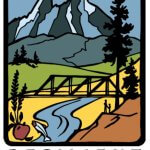
In 2019, MVCC convened a group of community leaders in every sector—towns, businesses, agencies representing health and emergency preparedness, economy, agriculture, infrastructure and natural systems—to form a task force to help the Methow Valley prepare a Climate Action Plan. After two years and thousands of hours of committed work, this task force released the Methow Valley Climate Action Plan, a comprehensive plan that presents a vision and road map for our community to prepare for the impacts of climate change and reduce local sources of greenhouse gas emissions. Grounded in science, and based on input from hundreds of community members, the Climate Action Plan details realistic, practical strategies and actions that our communities and local governments can take to become more resilient and carbon-neutral. Resilient Methow a program of MVCC, works to coordinate and implement the Methow Valley Climate Action Plan.
Recent Work
To celebrate one year since the Methow Valley Climate Action Plan was completed, Resilient Methow hosted a Climate Action Plan Forum in the fall of 2022 where they highlighted the valley-wide accomplishments that have helped to meet climate action goals. The list is extensive and includes everything from water banking efforts to foodshed infrastructure to wildfire risk reduction. In the spring of 2023, Resilient Methow hosted a home electrification forum. They have created a list of grant and funding opportunities that are related to climate action goals.
Land Use
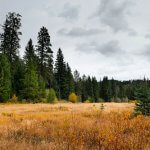
Over the last 45 years MVCC has developed an expertise in land use—a necessary skill in guiding smart development that is in line with community values and our surrounding landscape. Through this work, we’ve come to recognize that the community fabric we value in this Valley is shaped by the rural character of the place and must be multi-layered and diverse to thrive.
Recent Work:
Recently we’ve continued our strong advocacy for local and county land use policies to protect open space, wildlife habitat, and our rural way of life. This has included partnering with Futurewise to push for a stronger and clearer management for growth including the adoption of an updated subarea plan for the Methow. With the Methow surrounded by public lands, we’ve been heavily involved in collaboratively developing strategies for forest restoration projects that use prescribed burning and thinning to improve forest health. We’ve also actively monitored and raised concerns about the Mission Restoration Project which began implementation last year.
Affordable housing continues to be a pressing issue to ensure our local community members—of varying professions and income levels—can afford to call this valley home. We’ve worked to develop a set of recommendations for affordable housing strategies, in partnership with the Housing Solutions Network and continue to advocate for responsible and accessible housing options in the towns of Twisp and Winthrop.
Water 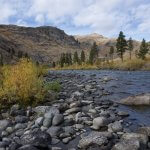
The Methow Valley is graced with clean, cold water that flows through the Valley from the Cascade crest to the Columbia River. This Methow River watershed provides water for wildlife, homes, towns, and farms. For hundreds of generations, indigenous communities have relied on the river both as sustenance and as spiritual connection. As our snowpack diminishes and summers heat up, water is becoming even more precious.
Recent Work:
Recently, MVCC has been working tirelessly behind the scenes with the Department of Ecology and Okanogan County to permanently prevent out of basin water right transfers and protect the Methow River flows. In the Okanogan Valley we have worked to grow local, regional and national support for the removal of Enloe Dam and support Indigenous efforts to restore the Similkameen River. We continue to press the County to pass a Comprehensive Plan that prepares for shifting water supplies and directs growth towards towns with existing water infrastructure.
Air
Clean Air Methow (CAM), a program of The Methow Valley Citizens Council, offers seasonal programs to improve air quality where possible and protect health where necessary. The program was started in the winter of 2013 to address poor air quality from weather inversions and home-heating wood smoke. After the Complex Carlton fire in 2014, Clean Air Methow expanded its mission to make the Methow a “smoke-ready community.” In addition to knowing its sources of air pollution, understanding the health risks of smoke, and reducing its contribution of particulate matter to the atmosphere, a smoke-ready community also works to protect and support its most vulnerable and underserved residents who are the most susceptible to the negative health impacts from smoke.
Recent Work
Over the last two years, the woodstove exchange program has removed 32 smoky old stoves throughout Okanogan County and replaced them with more energy efficient, cleaner burning stoves. To reduce the smoke during shoulder seasons, CAM also organized five days of chipping/vegetation drives in the Methow Valley (310 loads total, 94 homes during Twisp curbside chipping) last year. Clean Air Methow maintains and supports a network of 30 clean air ambassadors and outdoor air monitors to help inform the community about air quality in various parts of the valley. They also continue to be a leader in North Central Washington collaborating with other counties about how they can seed air programs into their public health framework.
Wildlife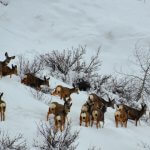
The Methow is surrounded by public land and hosts a wide variety of wildlife. MVCC works in support of public land agencies to protect and preserve wildlife habitat.
Recent Work: In the last year we’ve developed a set of local responsible recreation guidelines in collaboration with Methow Trails, brought attention to a proposal to expand ATV use on public roads throughout the Methow Valley and kept the community up to speed on mule deer winter closures. With the release of Grizzly Restoration Plan for the North Cascades, we are working to grow local support for reintroducing an iconic, native species to the North Cascades.

